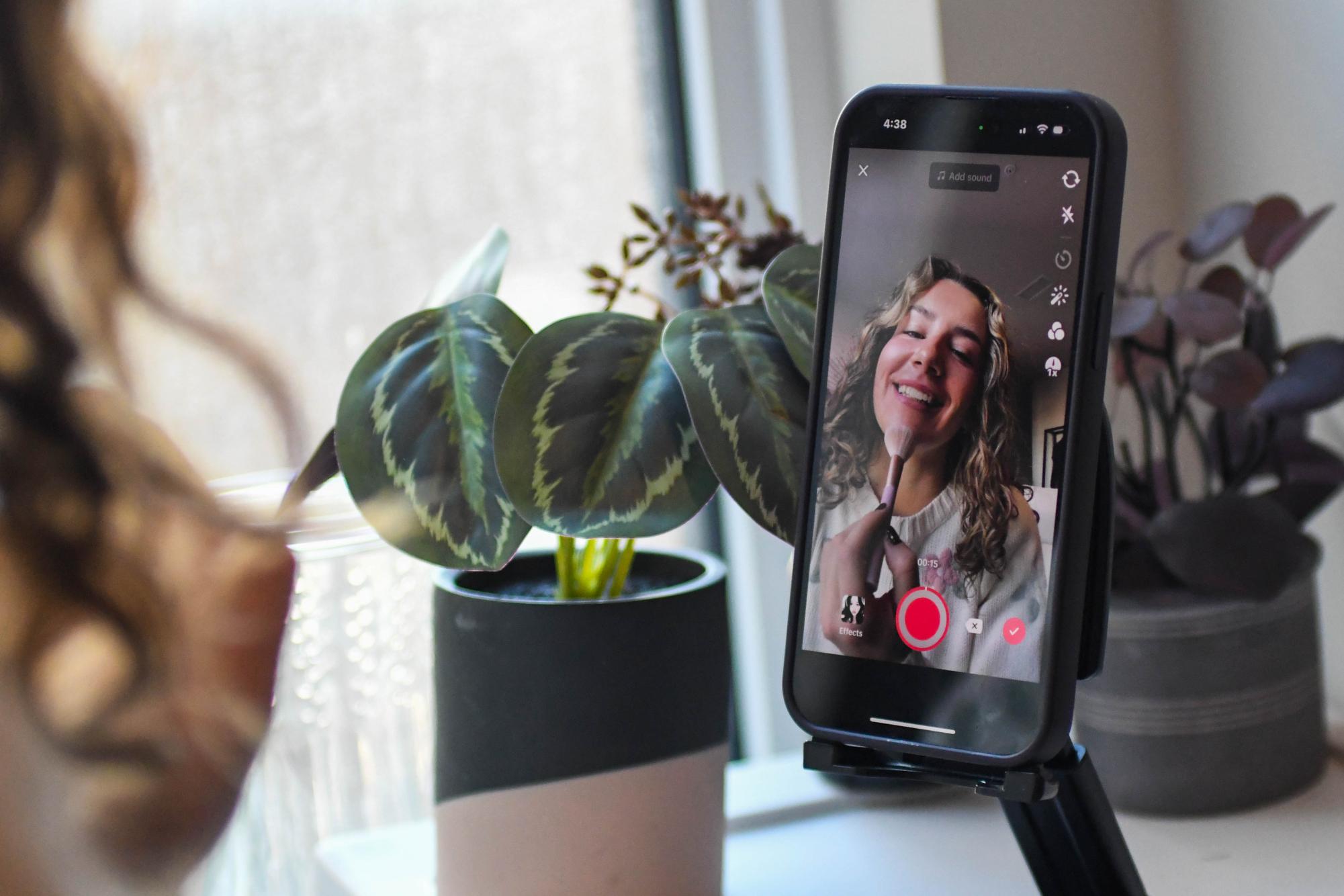Pitt students react to possible national TikTok ban


A Pitt student uses TikTok to film a makeup tutorial.
Though he admits that he may use TikTok too much, Erik Hart, a first-year computer science major, thinks “banning it is a little silly.”
The United States House of Representatives passed a bill on March 13 that, if signed into law, would force TikTok’s parent company ByteDance to sell its share of the app or face getting banned from American app stores. The bill increases tension over ByteDance’s alleged ties to the Chinese government and the resulting data privacy concerns, according to the New York Times.
“I don’t think that’s necessarily any more than a regular privacy concern [compared to] an American-based company,” Bella Lardin, a junior electrical engineering major, said. “We’ve seen Facebook, for example, have issues with privacy.”
Grace Lamberto, a sophomore communications major, agrees that these issues exist on different social medias, not just TikTok.
“This is a topic that has been discussed with almost every social media platform over the years,” Lamberto said. “I wouldn’t say I have information I’m worried about getting stolen on TikTok.”
Hart is also unconcerned by the prospect of his personal data getting into the wrong hands, at least on a casual app like TikTok.
“I’m personally not concerned just because I didn’t really fill in my actual information for my account,” he said, “I do that for a lot of my accounts that aren’t super serious.”
According to the Times, President Joe Biden has indicated he would sign the bill if it reached his desk. The bill faces a tough road in the Senate, according to ABC News, as lawmakers debate whether to rewrite the bill and which committees have jurisdiction.
Additionally, according to ABC, after backlash from thousands of young people, TikTok mobilized with a pop-up message urging them to call their representative. Vice President Kamala Harris said the Biden administration does not wish to ban TikTok but rather force ByteDance to give a third party company control of the app.
“I don’t really like the idea of the government being involved in app bans,” Lardin said. “Obviously if there’s an app where horrific things are going down, that’s one thing, but something like TikTok where it’s the kind of content you would see on any mainstream social media platform… it gets a little iffy in terms of how much control you really want [the federal government] to have.”
She also noted the potential harm that would come with banning TikTok.
“I think it is a very useful tool … for getting information out if you are a brand,” she said. “Especially in terms of music, I think TikTok has universalized music in a way that no other platform has.”
Hart understands the House’s point of view but still doesn’t agree with its actions.
“I think that if the government genuinely sees a security concern, it’s valid for them to want to react to that,” Hart said. “But I don’t really think it’s necessary.”
Lamberto, on the other hand, feels strongly about potential governmental overreach with a decision like this.
“[The federal government] wants to act like they’re trying to keep citizens safe, but we all know it’s about their issues with China,” Lamberto said. “Taking away a form of free speech should not be in their power.”
While there’s never been a nationwide ban, smaller TikTok bans have taken effect in recent years. Notably, many colleges banned the app on school-issued devices and on campus WiFi to prevent sensitive data from getting into the wrong hands. The Florida State and University of Texas systems are just two of the schools to have recently taken this measure.
When asked about how he’d feel if Pitt banned TikTok on campus WiFi, Lamberto said, “I definitely feel like it would be an invasion of our free speech. How would what I’m doing on my phone affect the University?”
Conversely, Lardin sees no issue with individual institutions banning TikTok.
“I think the government really shouldn’t be involved in banning it,” Lardin said. “But colleges, schools and employers should absolutely have the right to if they don’t want people using it on their networks.”
If the bill becomes law, ByteDance will have six months to sell the company. However, the actual timeline for a total ban could take much longer. According to CBS News, the company will almost certainly challenge the law in federal court, delaying a potential ban for months or even years.
Recent Posts
Review | Tyler, the Creator and friends come to Pittsburgh on the ‘Chromakopia’ tour
With the release of his eighth studio album, “Chromakopia,” decorated rapper, songwriter and producer Tyler,…
A Good Hill to Die On // The motivation we all need
In this post of “A Good Hill to Die On,” staff writer Sierra O’Neil discusses…
Who Asked? // Is it really the damn phones?
This installment of Who Asked? by staff writer Brynn Murawski describes her brief journey limiting…
Students are ‘upset, but not surprised’ over denial of gender affirming care at UPMC CHP
Pitt students and LGBTQIA+ members express their concerns about the recent denial of gender affirming…
Take Madness Final Four | Battle of Pennsylvania, 412 and Just Outside of Philly clash
Welcome to the Final Four of Take Madness! We are down to four talented writers,…
Column | Best Sports Environments in Pittsburgh
Pittsburgh is undoubtedly one of the best sports cities in America. A deeply passionate fanbase…

